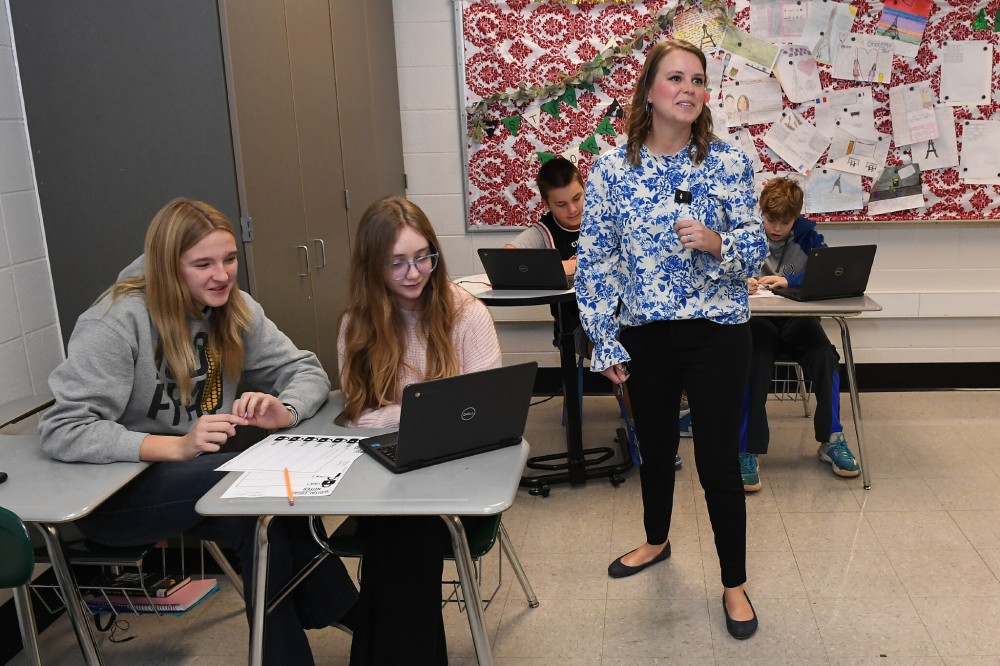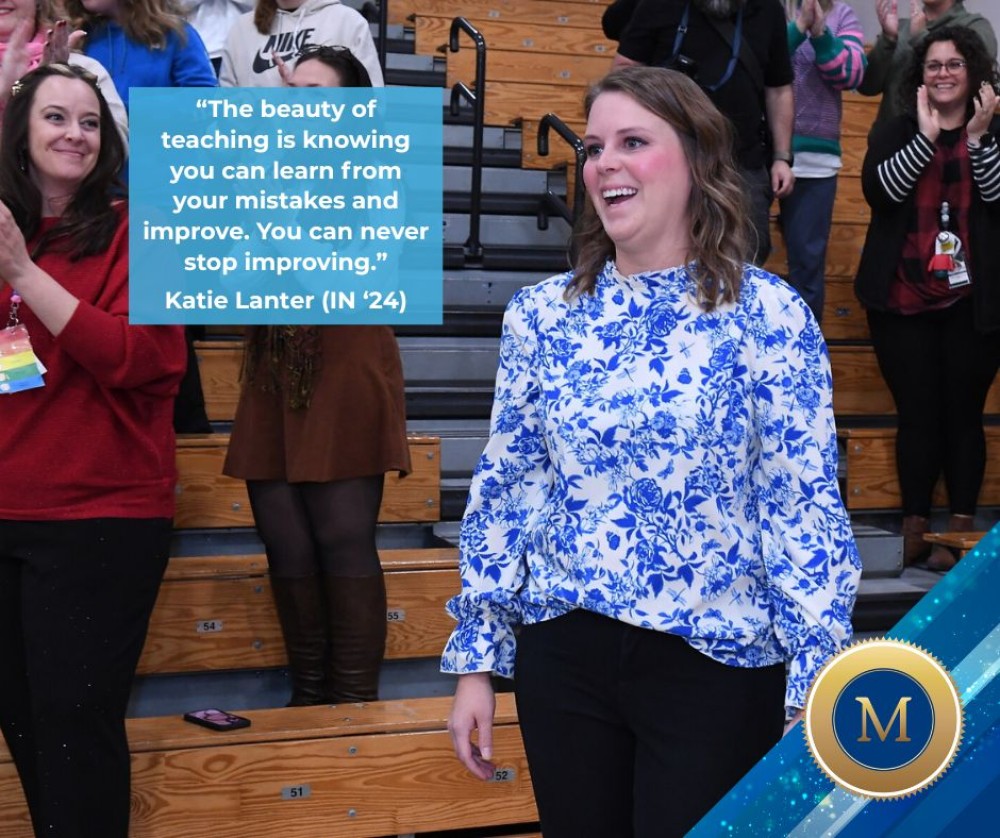Spotlight: Katie Lanter (IN '24)
July 15, 2025
Indiana Milken Educator Katie Lanter (IN ‘24) is an English Language Arts teacher at South Ripley Junior High School in Versailles. Lanter is committed to maximizing student outcomes through data-driven strategies. As a leader, she not only shapes the classroom, but also drives schoolwide success, from guiding accreditation efforts to preparing students for high school. Lanter received a 2024-25 Indiana Milken Educator Award on December 12, 2024.
Milken Family Foundation: How have students responded since your Milken Educator Award surprise?
My students were elated about the Award. After receiving the Award, some of them were worried that I was instantly going to get whisked away to Los Angeles never to think of them again! Once they realized I wasn’t going anywhere for a while, they were genuinely happy for me. They’ve been cheering me on ever since!
MFF: Who are your role models as an educator? Is there an experience you had in the classroom as a student that influenced your practices or motivation to teach?
My role models as an educator have been the teachers who have come before me and the ones I have worked alongside since becoming a teacher. Each has impacted me to make me into the teacher I am today. When I think about the best teachers I’ve had, I remember the feelings associated with being in their classrooms. I especially remember my sixth grade reading and history teacher, Mrs. Bye. I remember the warmth of her voice and being transported to another world when reading The Lion, The Witch, and The Wardrobe. I remember being mystified by the atrocities of the Holocaust, but most of all, I remember her smile and how comfortable and fulfilled I felt when being in her room. The hope that I might also give those same feelings to my own students is what drives me to want to be the best teacher I possibly can.
MFF: Tell us about your first year of teaching. What memories stand out? Who or what helped you through it?
I was blessed that my first teaching job was at the same middle school I attended as a student. It helped to instantly have a community when I started teaching there, as I knew several of the teachers and everyone was eager to help. However, the thing that helped out most was teaching with another first-year English teacher, Renee. It was a larger school and she and I were in charge of the entire eighth grade English curriculum. We were left with nothing except our own ideas and a cabinet full of books. It was sink or swim, and we learned to swim together. I remember being so overwhelmed all of the time, but I was also so relieved to know that I had someone right there with me who could serve as a think tank. To this day, Renee is someone who has such a special place in my heart because we went through so much together in our first couple years.
MFF: What do you hope students remember from their time with you?
I hope that my students always know how much I love them and how I will always root for them for their entire lives. I know that I am just a small part of each student’s journey, as they are of mine, but each year so many memories are made. I get to know each of my students—who they are as people, the things that interest them, the way their minds think, and their goals and dreams. I get to see the way their eyes light up and their smiles. I just hope that, at the end of the day, they remember how much I valued and cherished each and every one of them.
MFF: Can you share how data you’ve analyzed led to a specific change in instruction and improved student outcomes?
As a reading teacher who helps to prepare students for standardized testing, data is something that is very integrated into my teaching practices. Throughout the year, I constantly monitor students to watch for growth and trends. This data then helps me to recommend students for specific supplemental classes or ways to alter my own teaching.
For instance, a few years ago, I realized through data that although I was teaching the material, students weren’t retaining it as well as I needed them to. As a result, I ended up altering the way I do my Daily Frontloading (Bell Ringer) activity. I now loop my curriculum on Fridays by incorporating something I call “Quick Facts.” Quick Facts are 5-10 questions that students answer that repeat key takeaways from the year. This is often key vocabulary and concepts that I cannot afford for them to forget. Since adopting this practice, I have noticed so much improvement in retention, and, ultimately, higher test scores.

MFF: What was the biggest challenge in aligning junior high and high school instruction, and how did you overcome it?
When I think back to the start of my first high school credit class, I have to laugh at the circumstances. I remember like yesterday my guidance counselor reaching out to me at the end of the school year asking if I wanted to teach a creative writing course the next year. Of course, I agreed. I spent time that summer prepping materials and planning for a nine-week course for my seventh grade students. The day before school started (on our first teacher day), I pulled up my digital gradebook and my heart dropped to see that my class had populated. Not only was the class an 18week course, but it was a high school credit class for eighth graders! This meant that I had to pivot my ideas quickly and had to rework my entire curriculum. In a way, it felt like going back to my first year of teaching. There were a lot of things that worked, and some things that didn’t, but the beauty of teaching is knowing you can learn from your mistakes and improve. You can never stop improving.
MFF: What advice would you share with people who are interested in becoming teachers?
The best motto that I have learned to live by is to pick a place and start. So often as a beginning teacher, it is so easy to get overwhelmed by all the things that need to be done—the lesson planning and curriculum building, the grading, the data, the meetings, the duties and extracurricular obligations, etc. At some point, you just have to start. Progress is progress. You’ll learn to fine tune and improve, and you’ll get better at time management and prioritizing. But for today, you just need to pick a place and start.
Don’t miss any new articles and updates from Milken Educator Awards:


